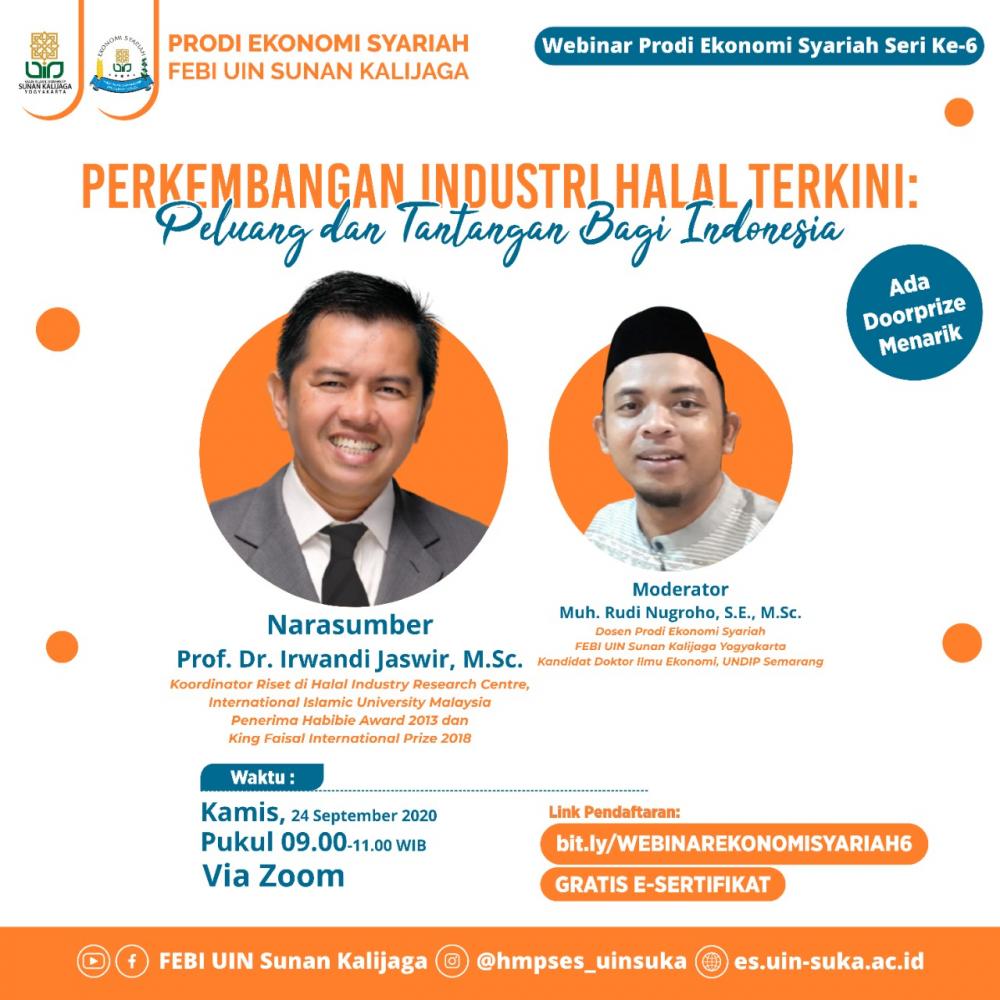Islamic Economics Study Program Holds Discussion on Halal Industry with World Halal Experts

The Islamic Economics Study Program, FEBI, UIN Sunan Kalijaga held a series of online seminars called the Series Webinar, leveraging Zoom technology. The study program has successfully conducted 6 webinars. The most recent webinar, the 6th in the series, delved into the Latest Development of the Halal Industry: Opportunities and Challenges for Indonesia. This insightful event took place on Thursday, September 24, 2020, from 09:00 to 11:00 WIB. It featured engaging presentations from speakers and facilitated a Q&A session, fostering valuable interaction between participants and the speakers.
The event commenced with opening remarks from the host, Mrs. Lailatis Syarifah, followed by welcoming speeches. The first speech was delivered by Mr. Misnen, the Vice Dean of FEBI UIN Sunan Kalijaga, and the second speech was delivered by Mr. Abdul Qayyum, the Head of the Islamic Economics Study Program.
Following the speeches, the event was moderated by Mr. Rudi Nugroho. The distinguished speaker for the 6th webinar series was Prof. Dr. Irwandi Jaswir. The webinar commenced with a presentation on the evolution of the halal industry, tracing its journey from traditional products like processed food and beverages to the incorporation of quality-enhancing ingredients and logistic services. It then delved into the emergence of new products such as cosmetics, health products, travel, and fashion.
Halal encompasses quality not just from a Sharia standpoint, but also from a business and economic standpoint. As a result, discussions about halal products are not limited to the Muslim community. The crucial factor is the quality of the products, given the expansive market of over 2 billion Muslims worldwide. For instance, the Aladdin Group, the largest halal e-commerce company in Malaysia. Currently, halal has entered the digital era, offering even more significant prospects and drawing attention from both Muslim and non-Muslim consumers.
The halal ecosystem encompasses a comprehensive range of activities. It goes beyond mere certification to include production, services, infrastructure, government support, and human capital. The global halal industry market, valued at USD3.1 trillion, comprises non-food products at USD1.52 trillion, food at USD0.58 trillion, and services at USD1 trillion. In general, the pandemic has significantly impacted industries and economies worldwide, including the halal industry. However, two sectors, halal food and halal pharmaceuticals, have remained relatively unchanged, indicating the enduring demand for essential goods such as food and medicine, while sectors like cosmetics, travel, and clothing have experienced declines.
For instance, 2300 Korean cosmetic products are currently in the process of seeking halal certification, with 90 cosmetics in Korea already having obtained this certification. In Korea, lime products are transformed into vinegar and exported to 43 Muslim countries, as vinegar is considered medicinal according to a hadith. Similarly, Japan is gearing up to attract Muslim visitors as a lucrative business opportunity. Taiwan's halal industry focuses on agriculture and fisheries, as well as Saudi Arabia and China.
Three key challenges in the halal industry that demand careful consideration are raw materials, the processing methods, and analysis techniques. Within the Islamic framework, a multitude of concerns arise in the halal industry, spanning the categorization of products as either animal or plant-based, the methods utilized in processing, the composition of additives, packaging, distribution, and sales.
As the event drew to a close, a Q&A session was initiated, and three thought-provoking questions were chosen to receive prizes from the organizers.
The webinar saw a great deal of enthusiasm from the participants, with 100 people attending via Zoom and 50 via YouTube, hailing from various regions in Indonesia.
The event is also available for viewing on YouTube: https://youtu.be/aC58U__5mLU
